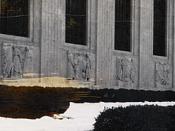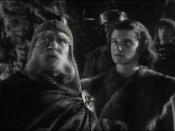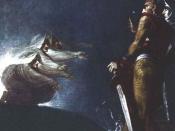Macbeth by William Shakespeare is a wicked display of one man's weaknesses and the forces that possess him. Macbeth was gullible and single-minded. He was obsessed with the throne, which became his ultimate goal. The witches were misleading with their ambiguous predictions because they wanted to disrupt the order of the hierarchy. The witches and the powers that they represented roused Macbeth to the kingship and eventually to his death.
Macbeth, just like anybody else, had some weaknesses. He was a gullible and a very single-minded person. He always thought of himself as being better than the rest. So he found nothing wrong with the witches' forecasts of him becoming the king of Scotland. "All hail, Macbeth! Hail to thee, thane of Glamis! ⦠All hail, Macbeth! That shalt be king hereafter" This was all part of the witches' plan. They knew that Macbeth was both single-minded and gullible, and took full advantage of it.
Macbeth let these predictions go to his head and he expected King Duncan to make him the next in line for the throne. When this didn't happen, Macbeth saw no other alternative than to murder King Duncan. Due to the witches' forecasts Macbeth thought he deserved the throne, almost like it was meant to be. Macbeth's clear thought of reasoning became clouded as his ego increased. He no longer knew the difference between right and wrong. He was being guided by supernatural powers.
It was the witches' power that persuaded Macbeth to kill Duncan. They enabled him to see a floating dagger that lead him directly into Duncan's chamber, where he committed the murder. As the play progresses, Macbeth became more dependent on the witches' and their predictions. He insisted that they tell him more about what his future holds. This request is the witches' chance to further mislead Macbeth. "Be bloody, bold, and resolute; laugh to scorn / The power of man: for none of woman born / Shall harm Macbeth." Through their ambiguous predictions, they are able to build up Macbeth's confidence to the point where he believes he is invincible. He is certain that every man is born from a woman, and therefore no man can hurt him. This prediction only increases Macbeth's ego and further clouds his judgement. This is a fatal mistake for Macbeth.
The witches wanted to disrupt the chain of being. This was their goal from the start of the play. "When shall we three meet again? ⦠Upon the heath. / There to meet Macbeth â¦" These lines clearly show their intentions to manipulate Macbeth into their wicked deeds. The witches used their predictions to deceive Macbeth into believing they were helping him. They were able to successfully corrupt a dedicated Kinsman to Duncan and possess him until his downfall. It was the witches that lead Macbeth, by evil, to murder Duncan. They caused chaos in the chain of hierarchy, and lead Macbeth to his death.
The witches successfully lead a weak-willed Macbeth into a life of evil through their ambiguous predictions. The only thing Macbeth cared about was maintaining the throne. The witches' predictions may have been ambiguous with a line of kings and predictions of invulnerability sharpened Macbeth's gullibility. The three sisters of evil were to corrupt and create disorder and chaos in an entire kingdom.
End Notes Macbeth W. Shakespeare, Longman Canada Limited 1965, Act I, Scene 3, L. 48-50 Act IV, Scene I, L. 78-81 Act I, Scene I, L. 1-12





